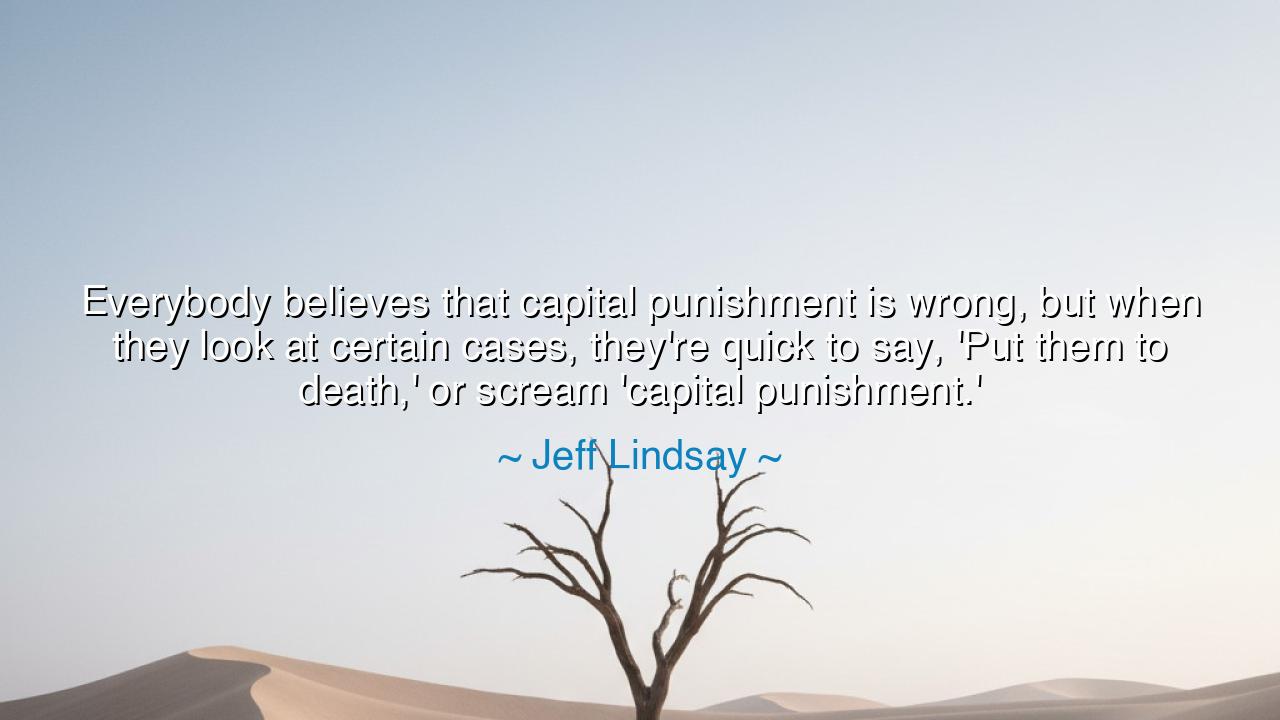
Everybody believes that capital punishment is wrong, but when
Everybody believes that capital punishment is wrong, but when they look at certain cases, they're quick to say, 'Put them to death,' or scream 'capital punishment.'






In the words of Jeff Lindsay, the creator of dark reflections upon justice and morality, there resounds a truth both ancient and uncomfortable: “Everybody believes that capital punishment is wrong, but when they look at certain cases, they're quick to say, ‘Put them to death,’ or scream ‘capital punishment.’” This is not merely a statement of hypocrisy—it is a revelation of the human heart, which trembles between mercy and wrath, between the ideals it proclaims and the passions it cannot master. In these words lies a mirror that shows how swiftly righteousness can turn to vengeance, and how easily compassion can yield to fury.
From the dawn of civilization, mankind has wrestled with the desire for justice. The ancients spoke of it as a divine balance—an eye for an eye, a life for a life—but wisdom later whispered that such balance, when pursued blindly, leaves the world darkened. Lindsay’s observation cuts to this eternal conflict: that we are creatures of feeling as much as of reason. We condemn the taking of life by law, yet when the crime strikes close to our hearts—when we hear of bloodshed, betrayal, or cruelty—we burn with a thirst for retribution. It is the paradox of the human soul: we know what is right, yet in our pain, we desire what is wrong.
Consider the ancient story of Moses, who descended from the mountain with the law of God in his hands, only to find his people worshipping the golden calf. In his anger, he shattered the sacred tablets and commanded judgment upon them. The man chosen to deliver divine law was himself undone by fury. So too, in every generation, those who uphold justice must guard their hearts against the same fire that consumes the guilty. Jeff Lindsay’s warning speaks precisely to this—when emotion governs judgment, justice transforms into vengeance, and vengeance knows no end.
In the modern age, the cry for capital punishment often rises not from calm deliberation, but from grief and fear. A heinous crime fills the air with horror, and the crowd, seeking relief from their helplessness, demands death. Yet when the storm has passed and silence returns, the conscience stirs. The same people who once cried “execute him” whisper instead, “perhaps we went too far.” Thus, society oscillates between mercy and wrath, never settling in peace. This is the cycle Lindsay seeks to unmask—the illusion that morality is fixed, when in truth it sways with the winds of emotion.
Let us remember the tale of Jesus and the adulterous woman. When the crowd gathered, stones in hand, ready to enforce the law, he said, “Let him who is without sin cast the first stone.” And one by one, the accusers left, their hands trembling with realization. For justice, without humility, becomes cruelty; and punishment, without compassion, becomes tyranny. The death penalty, when wielded as vengeance, is a reflection not of justice’s strength but of our inability to forgive.
From this, O listener, learn that true justice requires restraint. The heart must be ruled by wisdom, not by wrath. Before crying for death, one must look within and ask: Do I seek justice, or do I seek to soothe my pain? The difference is vast as the distance between heaven and earth. To uphold life, even when faced with evil, is not weakness—it is strength of the highest kind, the strength that preserves humanity’s light in the face of darkness.
Therefore, let each man and woman become a guardian of conscience. When the world demands punishment, be the voice that asks for understanding. When anger rises, temper it with compassion. For only when a society can weep for both the victim and the sinner does it begin to reflect the divine.
Jeff Lindsay’s words are a mirror to our age, a challenge to live not by impulse but by wisdom. Let us not scream for death, but labor for reform; not delight in vengeance, but strive for redemption. For a people that values mercy above retribution will endure, while those who feast on punishment shall one day be devoured by their own hunger.






AAdministratorAdministrator
Welcome, honored guests. Please leave a comment, we will respond soon